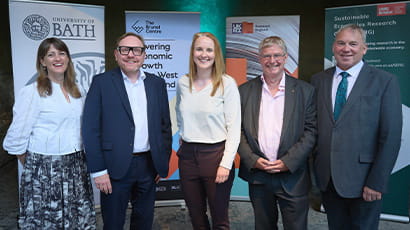AI software could help construction industry achieve net zero target

Computer scientists at the University of the West of England (UWE Bristol) are developing software that uses artificial intelligence (AI) and machine learning to help construction companies reduce the amount of embodied carbon in their building and infrastructure projects. The £800,000 projects are funded by Innovate UK, the UK’s innovation agency that works with organisations to drive the science and technology innovations that will grow the UK economy.
UWE Bristol’s Big Data Laboratory is leading the two-year project, which began in November, in collaboration with Winvic Construction and Costain, as well as working with Edgetrix, a start-up that specialises in cloud and AI solutions.
Together they are developing a programme that radically speeds up the process of determining how to reduce embodied carbon at the planning stages. Embodied carbon is the amount of energy (measured in CO2) consumed during the project’s construction phase and includes emissions from material extraction or manufacturing, and transport of materials, among others.
Construction organisations currently have caps on the amount of CO2 their construction projects emit, which is in line with the UK government’s objective to achieve net zero carbon emissions by 2050. This means that when planning the construction of a bridge or building, they need to estimate the amount of embodied carbon. This can then be reduced by using alternative materials that have a lower carbon footprint.
However, determining which materials to use can be time-consuming and can take up to several man-hours, the new software will use machine learning to make that calculation and save time.
Dr Lukman Akanbi, who is leading the project and works at UWE Bristol, said: “We are going to collect embodied carbon data from previous projects and machine learning models will be developed to learn the patterns from this data. The system will then be able to come up with alternative materials quicker.
“For a large scale project for example, instead of taking 5-10 hours to work out alternatives, it could initially take only one to two hours and further down the road, once more data is gathered, just a few minutes.”
The work, which started in November, will initially use Winvic and Costain’s commercial premises as test sites for the software. The plan is then to roll out the software to building designers and others working in the construction industry.
Dr Akanbi: “The objective is to make the system available to building designers and enable them to use it as part of their existing design systems, such as Autodesk Revit. This way they can implement embodied carbon analysis incrementally throughout construction projects’ delivery.”
He added: “UWE Bristol is a university that’s environmentally aware and is aiming to be carbon neutral by 2030, so it’s great that we are taking a lead in a project that is looking to help achieve similar aims.”
Related news

12 December 2025
UWE Bristol’s environmentally conscious and student-focused accommodation wins three awards
Purdown View, the world's largest certified Passivhaus student accommodation development, has been recognised at Property Week Student Accommodation Awards.

25 November 2025
Health-tech start up MyCelsius launches breakthrough cooling tech for hot flushes developed at UWE Bristol’s Launch Space
A pioneering Bristol-based health-tech company developing cutting-edge cooling technology for hot flushes has credited UWE Bristol’s Launch Space incubator with playing a key role in accelerating its product development.

14 November 2025
Lecturer wins prestigious Times Higher Education award for innovation in teaching
A senior paramedic science lecturer at UWE Bristol has been named the most innovative teacher of the year in the Times Higher Education Awards 2025.

13 November 2025
Alliance Medical and UWE Bristol launch UK’s first PET-CT postgraduate certificate
In a move set to transform imaging education, Alliance Medical (AML) and UWE Bristol have joined forces to co-design and develop the UK’s first PET-CT Postgraduate Certificate (PG Cert).

13 November 2025
New AI research to revolutionise animal welfare
A UWE Bristol research project will combine behavioural science and AI to create technology that understands not only what animals do, but how they feel.

29 October 2025
UWE Bristol academic unveils breakthrough in energy-efficient AI at NATO science forum
Dr Jonathan Lancelot has developed a new form of AI that could transform how intelligent machines operate in space, defence, and remote environments.

07 October 2025
Academic playing role in project to find hidden graves in Mexico using drone technology
A UWE Bristol lecturer is playing a part in a project using drone technology to locate concealed graves in Mexico.

01 October 2025
New funding for researchers to develop trustworthy clinical AI for assessing brain activity
Researchers have received funding from UK Research and Innovation to help bring their innovative brain-monitoring AI technology closer to real-world use.

11 September 2025
New study to investigate augmented reality as an intervention for emotionally based school avoidance
A UWE Bristol researcher will support a new study exploring whether an augmented reality board game can help young people with emotionally based school avoidance (EBSA).

22 August 2025
A decade of Future Space: How UWE Bristol’s enterprise zone is powering innovation and economic growth
Tracey John, Director of Research and External Engagement, reflects on the impact of Future Space and its role as a launchpad for cutting-edge companies shaping the future of how we live and work.

11 July 2025
Wound dressings developed with support from UWE Bristol to be launched by global firm
Technology that a team of UWE Bristol scientists helped develop to aid the healing of chronic wounds will be used in new ‘smart dressings’ being launched by global medical company.

03 July 2025
Research lab The Brunel Centre opens to power sustainable and inclusive growth for the West of England
A new data and research centre designed to support sustainable and inclusive growth and industrial strategy in the region, has officially launched.






